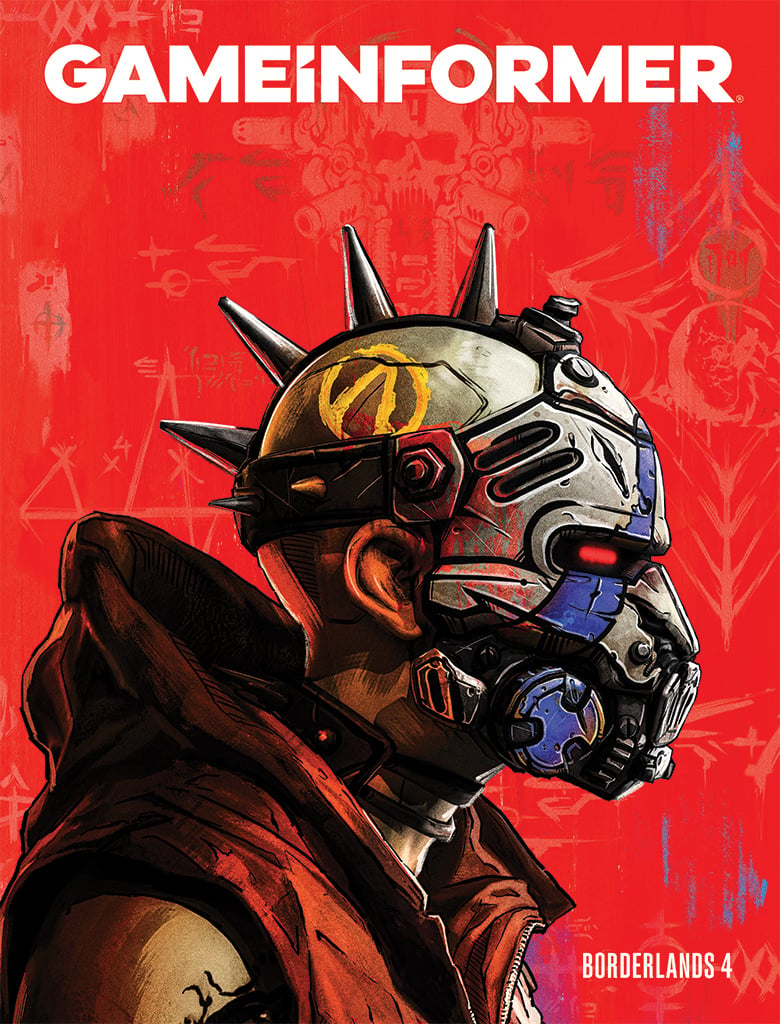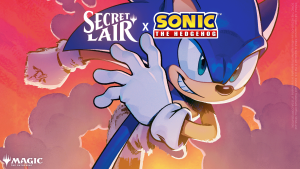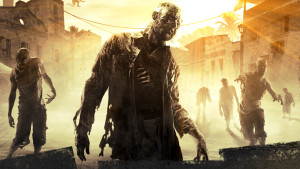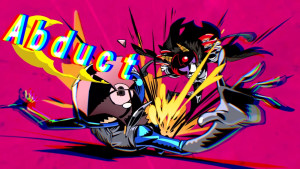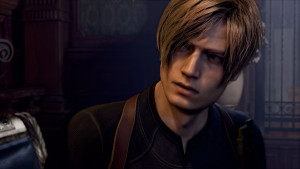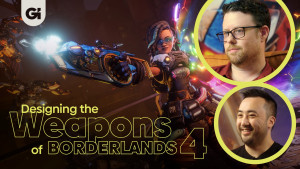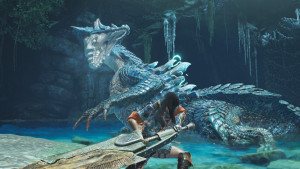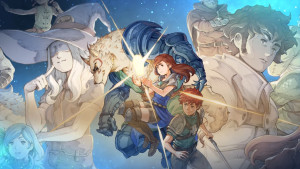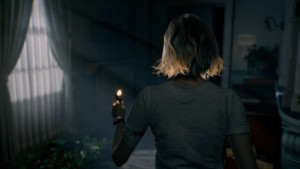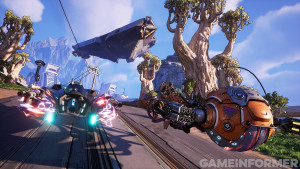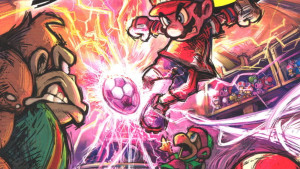Last chance to get your Borderlands 4 issue when ordered by July 1st. Subscribe Now!
Iron Galaxy’s New Leadership Team Talks Life Beyond Killer Instinct
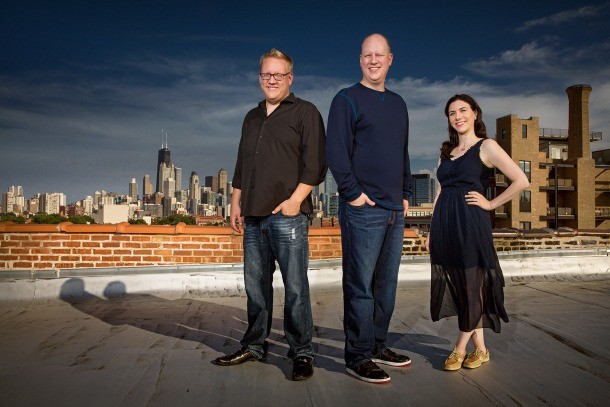
Earlier this week, Iron Galaxy announced that Adam Boyes, the longtime head of developer relations and third-party publishing at Sony's U.S. games division, was coming on as the new CEO. Boyes had previously worked with Iron Galaxy founder Dave Lang at Midway in the early 2000s. Along with Boyes' addition, director of product development Chelsea Blasko was promoted to chief product officer. With a new-look leadership team, Iron Galaxy is hoping to expand on what the team has already done, as well as explore new areas of expansion and growth.
Iron Galaxy is perhaps best known for its work on fighting titles like Killer Instinct, Divekick, and Wreckateer, but the studio's catalog extends beyond those games. In addition to original development like those titles, Iron Galaxy has become one of the go-to studios for ports, working on releases including PS3/Xbox 360 ports of Street Fighter III: Third Strike, Marvel vs. Capcom Origins, and Darkstalkers Resurrection. The studio also worked on the Vita port of Borderlands 2 and the PC ports of the two most recent Batman: Arkham titles, Origins and Knight – the latter being widely criticized and eventually pulled from storefronts until it could be fixed.
Most recently, Iron Galaxy published Videoball, a sports game from indie developer Action Button Entertainment that has received strong pre-release reception.
We had a chance to chat with Boyes, Blasko, and Lang about how this move came about, what Boyes' addition means for Iron Galaxy, and their visions for the future.
Game Informer: What were the discussions like leading up to both Adam and Chelsea’s new roles?
Dave Lang: So, Chelsea’s been here the last six years – the company is almost eight years old now – and we’ve been growing steadily over that time doing just work-for-hire stuff. And it’s been really good, but it got to the point where we were so big that all of our focus was just keeping the existing business running and getting games out and we couldn’t focus on future planning and stuff like that. And so, we just kind of needed more firepower at the top of the company and when I started thinking about who that should be and who makes sense to bring into what me and Chelsea kind of established here, Adam was really the only person on the list. Obviously we’re really good friends, but above and beyond that, and more relevant to this discussion, and we worked together at Midway, we kind of came up through the ranks there. I know exactly what kind of person he is and seeing what he’s done at Sony and the kind of things we suck at and the things he’s awesome at just seem to go hand-in-hand. So, it also just fits. Adam as CEO is going to plot out the future stuff, and Chelsea and I can focus on the present and executing on what’s here. So, it all just kind of fits in my perspective.
Adam Boyes: Obviously I have my own reasons for coming on board. Dave and I have known each other; we came up at Midway together in 2003, we joined the same year within a couple weeks of each other. So, we’ve always kept in touch and worked across all of the different companies that I’ve been working with. But, for me it was just getting back to game development and, not necessarily getting my hands on the keyboard and programming, but working with creative teams and being able to build stuff was a huge, huge draw for me, and this is an incredible team of super-talented people that it just started making sense the more Dave and I were jamming on it.
GI: Adam, you said you were excited to get back into the game development side. What was so attractive about that?
AB: Well, you know, it’s funny, Brian. Because, I mean, when I was at Midway, when Dave and I were there together, we worked on SlugFest: Loaded and on Blitz: The League. There was this sort of... and it actually dawned on me from [working at Sony] – I loved my job there and I loved working with publishers and developers from around the world, and nothing made me happier than seeing a game like Firewatch come out and be super successful or The Witness and all these different studios that put their blood, sweat, and tears. And what I started to realize was giving birth to a product and putting it out into the marketplace [comes with a] roller coaster of emotions.
So as I traveled around the different studios and over the past year, I started just missing that feeling of being part of a family that focuses on one thing, which is putting out a game and pouring their heart and soul into it. I started sort of looking at my background of all the different, you know, from working in very complicated scenarios of like, doing this Star Wars deal with LucasArts, Disney, EA and PlayStation sort of collaborating on all that stuff together. And I started thinking about how could I apply that to the gaming industry, and what’s happened in the gaming industry. Because, right now, I think it’s absolutely the most exciting time to be an independent developer in the history of the industry. And when I look at Iron Galaxy, it’s so well positioned for what’s happening, you know they’ve been so involved in all emerging platforms.
Every time a new platform is coming out, they’re doing work on it, from Kinect with Wreckateer to mobile stuff with Scribblenauts. We’re on the cusp of VR and AR stuff which is super, super exciting. Then obviously all the new console platforms as well and when we look at the fighting game world and eSports and what’s happening in that place. So, you start to stack all these things up and the work that they were doing in publishing, and then really leaned in a lot of things that I fully believe in for the future. And also stuff that I can get super passionate about and bring my strengths to the table with all my relationships with publishers. And also collaborations, right? These collaborations I’ve had on a larger scale with big IP holders and stuff like that.
You know, right now Iron Galaxy is sort of spread out between Chicago and Orlando and that’s a huge strength. They’re able to collaborate with partners and work very closely together, even if they are apart. How can we take that to the next level? How can we sort of make more collaborative partnerships and stuff like that. So, when you tie all these things up together, and I look at the landscape of where the future’s going next, you know, five, ten years, to me in was kind of a no-brainer. And then knowing Dave for the last 13 years and it was, you know, meeting the teams and going to the studios, it was just like, ‘This is what I want to do with this crew.’
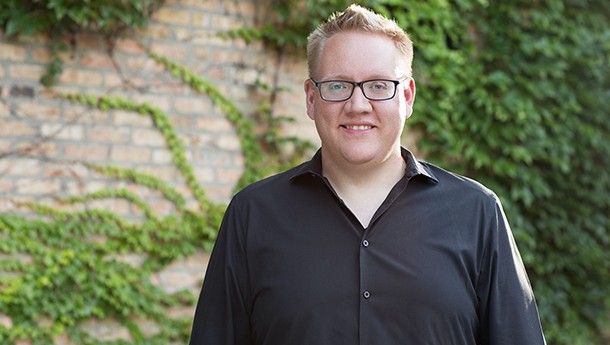
Iron Galaxy CEO Adam Boyes
GI: Your experience at PlayStation got you a lot of relationships with other publishers and developers, so how does that carry into this role beyond what you just said? Obviously you bring a ridiculously strong rolodex with you, but beyond that, what does all that experience you had at PlayStation, both being the guy who works on these deals and being a face of that company, mean for this role?
AB: I think it means that obviously all that publisher experience can now be applied. Dave and his team have worked closely with publishing Capsule Force and Divekick and Videoball and stuff like that. So how do we take that aspect of the business to the next level? How do we really understand how publishing works? Because publishing is super complex, and a lot of time that we spent at PlayStation was working with studios to help them understand the relationships of platforms and low-line media and support and stuff like that. I've got a little bit of an inside track on how that stuff works and how to bring basically best-in-class publishing methodology to the company. And then when we look at those relationships with publishers, obviously they have a face that they know and trust and they can basically talk to. obviously Dave, the Iron Galaxy team, and Chelsea have done a phenomenal job with many, many publishers out there. This adds that extra sort of layer of certainty to publishers.
You asked a question about being the face of it. That definitely helps too. And that’s not just with publishers and developers, but also with the IP holders. So that really expands our abilities, so now in my opinion, there’s nothing stopping us from doing anything that we want because we can have these [...] different relationships, walk into the room and some of them have seen me pulling off some bad dad jokes from the E3 stage. But that experience and knowledge of having been involved in many of the biggest deals at PlayStation is going to bring a lot of information and guidance to the company that we can apply.
GI: Do you think we’ll see more publishing deals like what Iron Galaxy recently did with Videoball with you on board?
AB: I think it’s definitely a place where a lot of my strengths lie, but right now we are looking at all the different opportunities out there. There has been a lot of work for hire work done in the past, there’s some IP ideas that the teams have, and then there’s also the [publishing deals]. So Dave, Chelsea and I are basically meeting very regularly to sort of hash out what does the next 2-to-5 year strategy look like as we build that up together. So, we’re not going to talk about it yet, but we’re definitely working on it right now.
DL: I think going forward we have to have the ability to be consistently successful publishing things, just to kind of have more freedom to do what we want to do. Now does that mean we’re publishing other people’s stuff? Does that mean we’re publishing little indie things? Does that mean we’re doing fundraising and publishing of bigger opportunities at Iron Galaxy maybe? We don’t know those answers yet, but I think one thing we all agree on is that we need to be able to publish stuff consistently and successfully, to go forward.
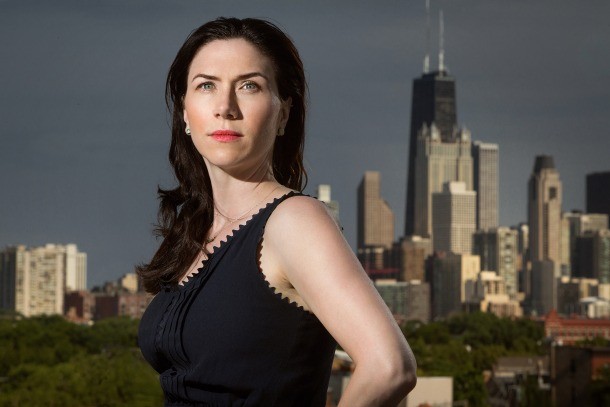
Iron Galaxy chief product officer, Chelsea Blasko
GI: Chelsea, what does your new role enable you to do?
Chelsea Blasko: Well I’m really excited to have another person to bounce ideas off of and work with on the future planning and looking more long-term. Basically my role doesn't change much as far as what I’ve been doing. I’m going to keep running the internal space of the company. I’ve been running the production and the operation, just kind of running all the boring machinations of the business for the last six years here. So that will all still be my primary focus, Dave will still be doing all the regular business development that he’s been doing, but I’ll also be partnering very closely with Adam and Dave on all the future stuff coming up. So pretty much I keep doing the same stuff.
DL: Yeah and one thing I think is cool about this is Adam coming is almost strictly an additive thing. We’re not stopping work on Killer Instinct, we’re not stopping doing ports. Chelsea and I can focus on our strengths and executing on the stuff that got the business to where it is, and then Adam can come in and put his layer of awesomeness on the future stuff we want to do, but it’s not at the expense of anything we are doing currently in the business. It allows me and Chelsea to have a tighter focus on that stuff which, I for one, look very much forward to.
GI: And one thing you have brought up a couple times is your hired work on ports. Why do you think that Iron Galaxy has become one of the go-to studios for that type of work?
DL: It’s several things. Mostly it’s execution. There’s not a lot of developers out there that can do stuff like The Elder Scrolls Online, right? That was a massive endeavor getting those clients to work on the consoles right. Or taking over something like Killer Instinct – a huge project – like taking that from another developer and being able to hit the ground running with it and not miss a beat. There’s not a lot of people out there that can scale to the size those things require, and still execute the hit dates and stay on budget and basically meet the publisher’s demands. I think over time we’ve proven to be one of the best in the world at that, and I think that’s why – we worked with Microsoft for like six years in a row, we worked with Bethesda four years in a row, we worked with 2K, we worked with WB, we worked with the same people over and over and over again because when you find a developers that can do what we do, you tend to want to hold onto them and work with them over and over and over again. So a lot of repeat business for us, we love that kind of stuff.
GI: We're now a few years into Killer Instinct and it shows no signs of slowing down. How successful has that game been for this studio?
CB: Yeah, it’s been pretty good for the studio. We really enjoy working on it. We have a great combat team, we have a long history with working on fighting games and a lot of people, a lot of developers here who are just really into that fighting game community in general. So, it’s definitely a source of internal pride for us. We know the Eyedol launch that just happened recently has been really well-received, people are really excited about seeing him come to the roster. So yeah, we’re definitely really excited to work on it.
GI: How does Killer Instinct's success influence how the studio operates outside of that property?
CB: Basically I look at all the projects that we do as pieces of the puzzle. Every project that we do gives us some new knowledge or some new fan base, some new relationship with a publisher, or other developer, that we can build on to do other big, interesting projects in the future. Doing Divekick even, probably a smaller core audience, but definitely helped build this credibility so that we could do something like Killer Instinct and build up that fan base that's going to be behind and trust us to work on the fighting game titles. So, I look at every project we do as a piece of the puzzle just building onto our own cool projects going forward.
DL: Yeah, and what Adam was saying, we’ve been on the cutting edge of new technologies when they launch. I look at that as not just technologies but like now we can say we've done whatever you want to call it... triple-A? I don’t know what you want... these categories kind of don’t mean anything anymore but like, a really big free-to-play experience where we have to ship major content monthly and kind of building the developmental discipline to do that over and over. You can kind of see the struggles that the people are having meeting that challenge, and the fact that we’ve done it, even if there’s no more Killer Instinct tomorrow, we take that discipline and that ability and it carries forward with us to the next project.
Even just watching Killer Instinct’s community grow, if you look at EVO, as someone tweeted out a chart – I don’t remember the exact numbers – they tweeted out the enrollment of each game of EVO year-on-year and obviously Street Fighter V was new so it was plus... there were only two games that weren't new that grew year-on-year. Killer Instinct grew 50% from last year. Most of the other games shrunk. The reason for that is because it’s free-to-play and because we’re constantly updating it, because we’re constantly engaging with that community. They know that as long as we can, we'll keep putting stuff out and they get excited about that. We know to come back the next month, so they don’t just leave. When the people start playing Killer Instinct they don't put it down for another game, and I think those are lessons that we can take forward with us as well.
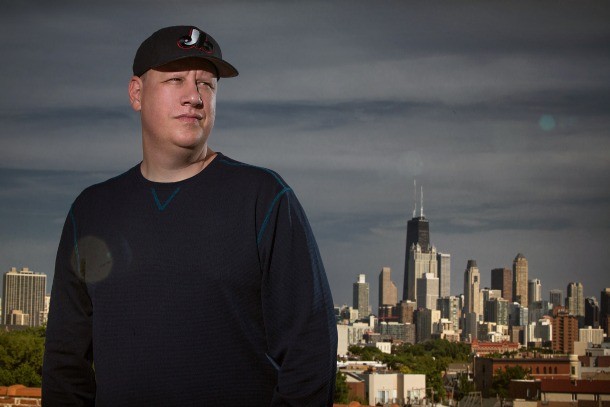
Founder of Iron Galaxy, Dave Lang
GI: Something you just mentioned about how the eSports community is so big and passionate and has provided you with noticeable returns. How does that play into the future of Iron Galaxy and the way you develop and market games?
AB: I think the important thing about it becomes a living, breathing product, and when Dave and I worked together back in the Midway days, you put a product out there and maybe there’s a patch or two. Previous to that there were no patches; games like this are living and breathing. So, you're on the cutting edge of responding and getting feedback from the active community. And like Dave said, the games that do that successfully continue to create user acquisition and the retention and all that important stuff. And what that does is that sort of reengages the base and gets them super excited about the next update. And so one of the things that Killer Instinct has prepared the team to do is really have that living, breathing product experience like so many other games. League of Legends is obviously incredible at that. Paragon is incredible at that. So the kind of stuff that really helps level-up the studio as a whole, to be able to utilize that for future products going forward.
DL: Yeah instead of just eSports too, there’s so many new platforms. Microsoft announced their vision for Xbox going forward – there’s iterations of platforms like that happening – you’ve got Nintendo doing whatever they do next, you’ve got VR, you’ve got AR, eSports is a platform itself. There’s really never been a better time to be an independent developer because we can just kind of look at this possibility space and see which opportunities excite us the most and go after them vigorously. It’s a great time to be doing this, and I think the timing for Adam coming in is perfect. Because he’s uniquely situated to exploit some of these opportunities in a way that me and Chelsea – just our sole focus being executing what’s on our plate right now – couldn’t be done by ourselves.
GI: AR and VR have been brought up a couple times now. How do you think the studio is going to look to leverage those technologies?
DL: Like every other studio, we’ve done some toying around with VR and it's super exciting. I think we are waiting for that one amazing prototype someone makes before we dive in wholeheartedly, but it's something that’s cool for sure.
AB: It’s one of those things that everyone’s talking about. Some of the coolest experiences that have really changed me as a person have been in those sort of mediums and I think dabbling in that world and having proficiencies in that world is critical to success in any emerging platform. We’re definitely planning to dabble a little bit more in that world. Nothing greater that we’re looking at or could give more details on but it's definitely a place that we see the demand out there and see a lot of partners that are super interested in that world, so we’ll be planning that space a little bit more.
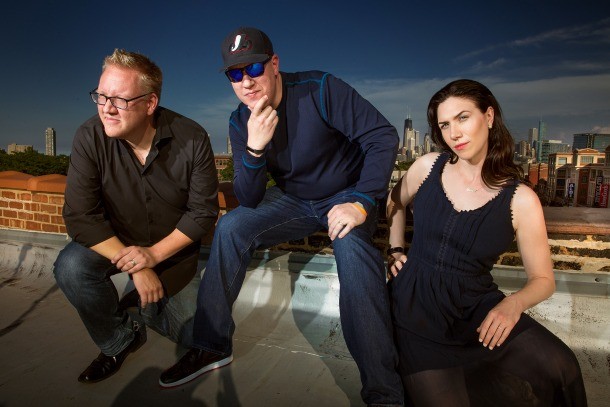
GI: With this team assembled the way it is now – Chelsea’s new role, Adam coming on board – what do you think the overall goals are? Do you push for more ports? Do you make a bigger push into triple-A? A bigger expansion on the publishing side?
AB: I think it’s a little bit of everything. Part of it is sitting down at the table together; we’ve had a lot of cursory conversations around what the future looks like. But my motto and creed has always been that I want to make great things, great people. And I think that is always going to be the guiding light around it and then how we accomplish that is, we’re kind of working on that strategy as we speak.
CB: For me, coming to Iron Galaxy was a totally different experience than my previous experience in games. I always worked at a studio where we did one game at a time and then kind of saw okay, how is this going to go? So when I came onto Iron Galaxy and we did multiple projects at one time, that was something brand new and exciting for me and I still really like doing that and people who work here enjoy that we get to dip our toes into a lot of different titles. We get to see so much of what goes on and for me that’s really exciting to still be diverse there, and have some of our own stuff, work with other giant franchises that people dream about working on, and also just do our own little IPs, our own publishing stuff. I really like that we have a diverse portfolio.
DL: One of the original visions for the company was a lot of us were at Midway when that place... it was unclear what was going to happen, and eventually spun into NetherRealm. But it was unclear if it was going to be there for a bit. Previously I had been at two studios that closed on me overnight and I knew when we built this place, one of the goals was build a game company that we can retire from. Like, I want to work together with my friends forever, and if that’s what you’re optimizing towards, stability, and if you want to be stable you need a lot of diversity in what you can do. We’ve done tech consulting, then we did ports, then we did creating your own IPs like Wreckateer, Divekick or working on original stuff like Microsoft.
Now with the stuff Adam’s going to do, we have even more things we can try. For me, it's not about picking any of those things and marching towards it; it's about picking the smartest thing at the time to be in, but having all options open. It's all about keeping the people when they come here. We look at this as like a semi-permanent thing, we don’t hire people and lay them off when the game is done; we want you to be here forever. It’s not like lip-service and bulls---. We really believe that, and to do that we have a lot of options available to you. It’s not so much that I’m dead-set on doing ‘thing x’ or ‘thing y’ so much as this is going to give us a lot more options, and that makes us a lot more stable and that makes me super pumped up.
CB: And for me also, the diversity has been one of the things that has kept us on the cutting edge of all of the platforms. We’ve had the opportunity to get our hands on everything early and solve really hard problems and it's kept us sharp and opens up more possibilities.
